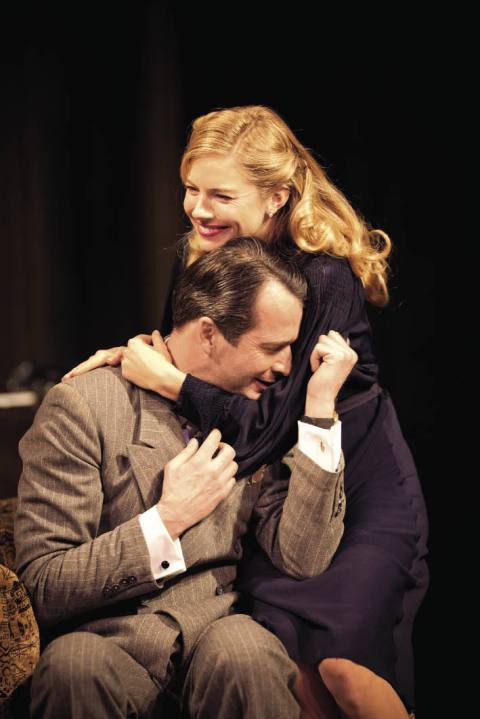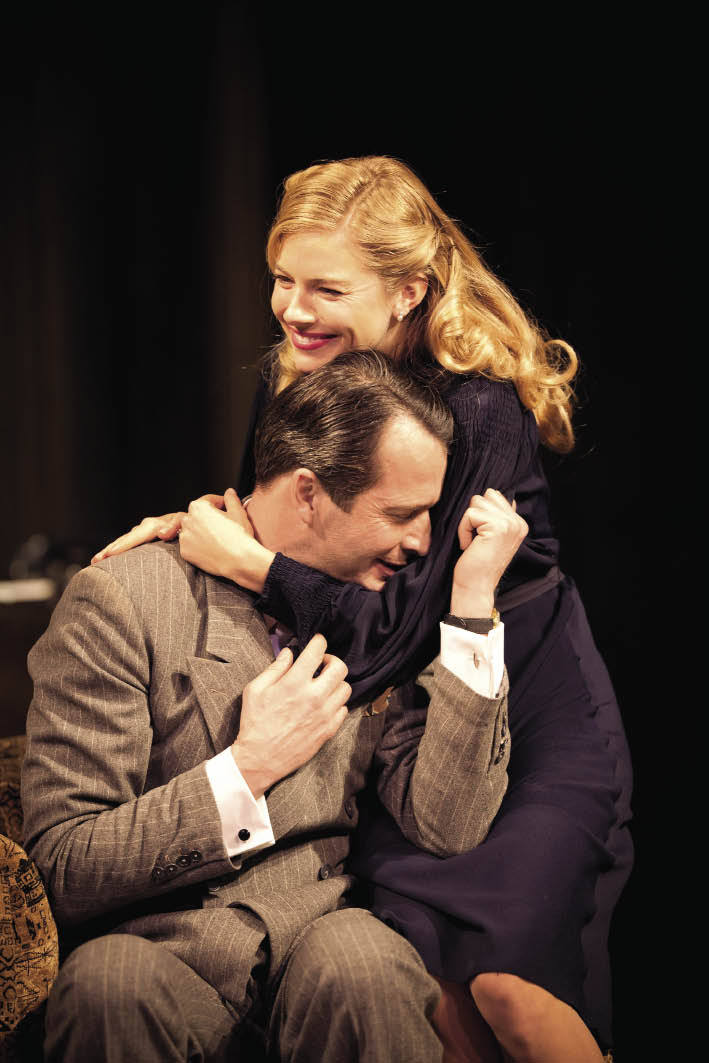Like a lot of classics, Blithe Spirit doesn’t quite deserve its exalted reputation.
Like a lot of classics, Blithe Spirit doesn’t quite deserve its exalted reputation. Every time I see it I discover a little bit less. Catty, slight, charming, clever and a touch too pleased with itself, the play shapes up as nothing more than an ingeniously plotted sitcom. It’s no surprise to learn that it was written in six days. The Blitz and the threat of sudden death had fostered a mood of defiant merriment in the British people which the play, dashed off in 1941, captures very skilfully.
Thea Sharrock’s production is competent, slick and faintly heartless. Robert Bathurst brings a nice blend of suavity and huffiness to the role of Charles. Ruthie Henshall, an over-smiley Elvira, prowls the stage with the sinuous suggestiveness of a ballerina who likes to moonlight at strip clubs. Elvira is, quite literally, a bitch of a part. All she does is throw things — tantrums, flowers, sarcastic comments — and Henshall makes what she can of the little on offer.
The honours go to Hermione Norris, whose ultra-stylish and steely Ruth gives the play some emotional weight, and to Alison Steadman, who plays Madame Arcati as a borderline outpatient. Some have complained that Steadman honks and barks too much, that she paddles her hands around her head distractingly, and that she over-emphasises Madame Arcati’s affectation and vulgarity. All true. But it’s an original interpretation and she carries it off with terrific conviction. The maid, played by Jodie Taibi, has been encouraged to indulge in a couple of unfunny clowning routines which suggest that Thea Sharrock is a day-tripper rather than a native to the world of comedy.
Terence Rattigan’s Flare Path, written in the autumn of 1941, also sets out to capture the emotional landscape of Britain during the Blitz and does so with infinitely richer stores of subtlety, feeling and truth. The setting is an RAF base on the Lincolnshire coast. Peter Kyle, an English film star, shows up intending to force his mistress Patricia to leave her husband Teddy. The snag is that Teddy is an ace pilot, suffering from nerves, who needs his wife’s emotional support if he’s to avoid being grounded and thrown out of the RAF in disgrace.
This is an ancient predicament. It’s Rick in Casablanca, it’s Aeneas in Carthage. Love or duty, ease or adversity, the salvation of the race or the indulgence of the self. Patricia’s faithless romance with Peter is contrasted with Doris’s marriage to ‘Johnny’, a Polish count who has joined the RAF in order to avenge the murder of his first wife by the Nazis.
One of Rattigan’s strokes of brilliance is to apply the conventions of the country-house murder mystery to an aircrew in wartime: anyone can be killed at any moment. And his adroit use of suspense keeps one in a fever of anxiety throughout. Just when he’s convinced you that the gravest dangers lie beyond the Channel he makes one of the bombers explode on take-off after being strafed by a rogue Messerschmidt. And he deploys suspense not just to tease and titillate but also to heighten emotion.
The play’s set-up places Patricia in the wretched position of secretly hoping that her adoring husband will be shot out of the skies during his next mission. The heart of the play is Peter’s realisation that his movie fame and his sex life are meaningless in relation to the agonies of the war which he witnesses as an unenlisted observer.
James Purefoy is silkily majestic as the sly and calculating matinée idol who confronts the emptiness of his moral life. Sienna Miller is well cast as the cool and elegant bombshell, Patricia. Sheridan Smith, bringing bundles of wit and warmth to the role of Doris, gives as moving an account of ordinary humanity raised to nobility by extreme suffering as I can recall seeing.
Undoubtedly, the play is one of the masterpieces of 20th-century theatre and Trevor Nunn’s version is pretty near faultless. One hesitates to use the phrase ‘emotionally shattering’ because it seems perverse to wish pain on a fellow theatre-goer but the cliché is true. For long passages during the second act the play is impossible to watch in anything approaching ease or comfort. Strong stomachs are required.
With every Rattigan work I see I become more and more baffled that he ever lost his place in the first rank of English dramatists. When he finished the script he urged his backers to accelerate its production. ‘The appeal, if any, is immediate,’ he wrote. He was right. He was also wrong. The appeal is eternal. Churchill, who like most politicians had scant interest in the theatre, was chivvied into seeing it by Clemmie. ‘A masterpiece of understatement’ was his verdict. Nothing need be added.








Comments